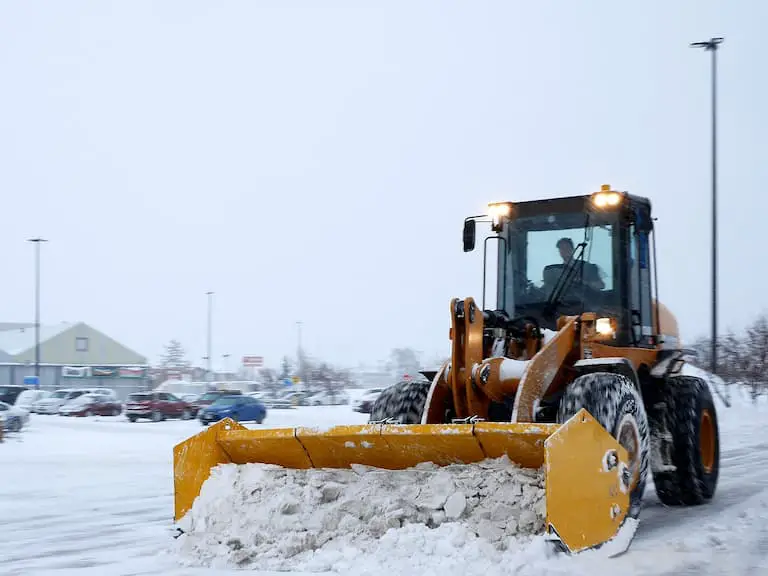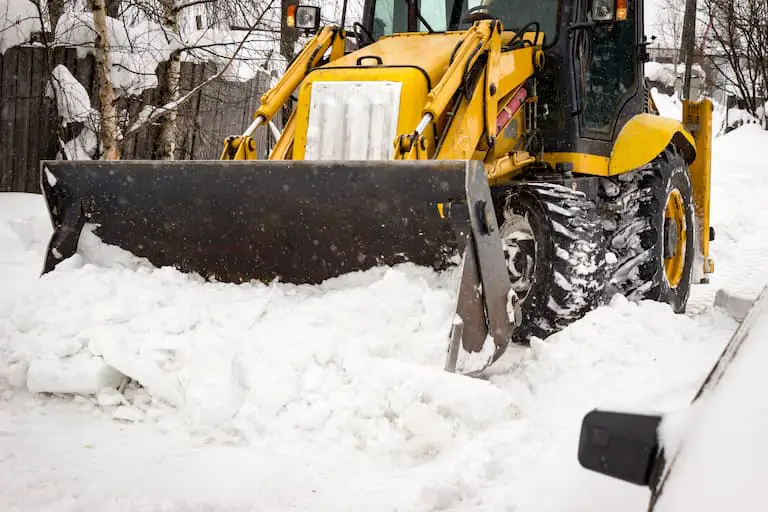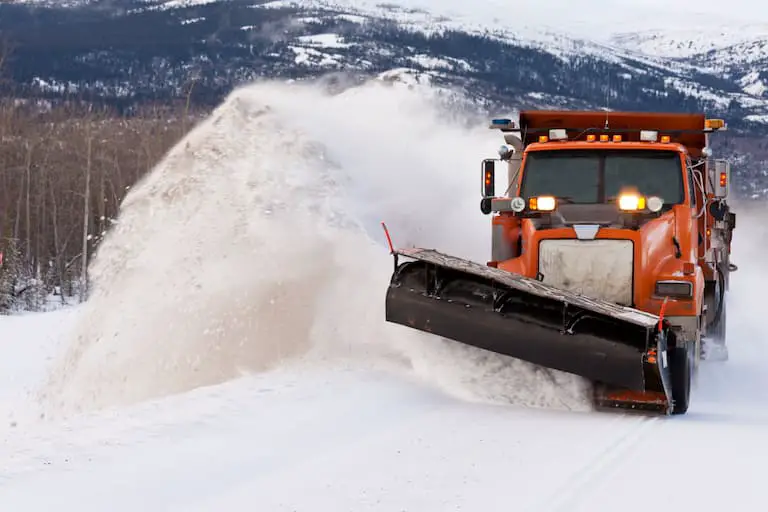As an Amazon Associate, we earn from qualifying purchases. We may also earn commissions if you purchase products from other retailers after clicking on a link from our site.
Heavy snowfall can have adverse effects, including making roads impassable. Snow plowing is one of the measures individuals or authorities take to clear snow and make roads accessible. However, is snow plowing bad for your truck?
Snow plowing is bad for your truck since it can cause damage. To minimize damage, plow properly, e.g., use a suspension load support or avoid plowing in overdrive. Follow the recommended guidelines if you’re planning to use your truck for snow plowing.
The rest of the article will discuss a few topics related to the question in great detail. So, keep reading to learn more.

Reasons That Snow Plowing Ruins Your Truck
Snowplowing ruins your truck if you don’t do the task properly. Running a snowplow on your truck is hard on your truck.
However, the magnitude of any damage will depend on how or when you plow snow.
To some truck owners, plowing snow is one way to earn extra bucks during winter, but they may have no idea that this activity has some drawbacks as it can damage their vehicles. It’s crucial to be aware of the potential shortcomings of snow plowing.
Here are four ways that snow plowing can damage your truck.
Snow Plowing Can Cause Transmission Problems
Transmission damage is the most common repercussion of snow plowing.
The problem occurs when the transmission fluid overheats or when you don’t plow snow correctly. Moreover, many truck manufacturers warn against plowing while in overdrive, as it also contributes to transmission wear.
The transmission fluid usually overheats when you constantly shift from forward to reverse driving while plowing. Also, accelerating before the transmission engages can cause spinning due to less traction.
Moreover, riding the clutch while plowing on manual transmission could overheat the fluid.

The Suspension Gets Damaged
You need to install a snowplow on the front of your truck to start plowing. But, since the plow, and the snow, adds extra weight to your truck, this causes the front part to sag or sway. Therefore, if you plow without a suspension load support, you can easily damage your truck’s suspension.
Plowing Can Compromise the Truck’s Body
Plowing snow isn’t a walk in the park, even for the sturdiest trucks. Apart from transmission and suspension damage, the truck’s body risks getting damaged. For instance, a snow pile can have destructive items, including wires, thorny branches, glass pieces, or jagged ice.
You can also compromise your truck’s body when you use the wrong type of snowplow.
Moreover, it’s unwise to plow at night when there’s lower visibility, as you can expose your truck to scratches or dents on its body if you bump into several obstacles.
Snow Plowing Can Rust the Truck’s Frame
Some truck owners pour salt on their driveways or sidewalks to prevent their vehicles from slipping. However, salt is not good for metallic materials, as it increases rusting. Therefore, if you’re plowing on salted snow, your truck’s frame will most probably rust over time.
How To Prevent Truck Damage When Snow Plowing
You don’t want to ruin your truck every winter during snow plowing, so it’s crucial to know how to prevent the damage and plow correctly. Moreover, this will lower your maintenance or repair costs.

Here are effective ways of protecting your plow truck from damage:
- Use a snowplow that suits your truck. Snowplows come in different sizes and materials. Hence, buy one that matches your truck’s Front Gross Axle Weight Rating (FGAWR). For instance, ½ ton trucks are compatible with smaller snowplows.
- Prepare your truck and plow beforehand. It’s crucial to have a maintenance check on your truck and plow to identify any worn-out parts or other defects. So, inspect all the fluids, battery, brakes, heater, bulbs, and other components for a truck. Also, ensure the plow has no rusted blades, loose fasteners, or ungreased parts.
- Install suspension load support. This will prevent suspension damage by enabling the front part of your truck to bear the extra weight of the plow and snow.
- Avoid overheating the transmission fluid. Always stop before you change from forward to reverse motion, and accelerate slowly to avoid the wheel spinning. It’s also crucial to replace the transmission fluid regularly to prevent overheating.
- Avoid plowing snow at night. There are higher chances of damaging your truck’s body at night due to lowered visibility. You’ll want to plow when you can see clearly, preferably in the morning and on clear days.
- Follow an appropriate plowing pattern. It’s not recommended to plow in random directions. Rather, follow a straight path by plowing the center first and then moving to the edges. You can also divide the area into portions to make plowing easier and less strenuous for your truck.
Can I Plow Snow With My Truck?
You can plow snow with your truck if you have a heavy-duty truck that’s designed for tough tasks. However, ensure that you buy a plow that suits your truck type.
Home and property owners always encounter problems when snow piles up on the driveways, sidewalks, and roads. So, this becomes necessary for making these areas accessible and reducing snow hazards.
Moreover, snow plowing can either be home-based or for commercial purposes.
If you’re planning to use your truck for home or commercial plowing, you should first confirm that it is up for the task by consulting the dealer or manufacturer. So, your truck must meet the horsepower and engine torque requirements for snowplow vehicles.
It should also be in good mechanical condition to push the heavy plow blades and the snow.
Your truck type will determine what kind of snowplow you can use. The type of snowplow to use will depend on what type of snow plowing you’ll be carrying out. Therefore, a 7” (17.78 cm) or 7.6” (19.3 cm) plow will be ideal for home plowing, while an 8” (20.32 cm) snowplow would be the best option.
Some of the best pickup trucks for snow plowing include:
- Nissan Titan XD
- Ford F series
- Dodge Ram 2500 (and higher)
- Toyota Tacoma
- Chevrolet Silverado Series 2500 (and above)
- Toyota Tundra
Final Thoughts
When winter kicks in, we all have to bear with the snow accumulation on our driveways, sidewalks, and roads. Snowplowing becomes one of the ways to clear the snow and improve accessibility.
However, snow plowing can take a toll on your truck if you don’t do it properly. Therefore, observe all the measures we’ve discussed in the article to avoid damaging your truck.
